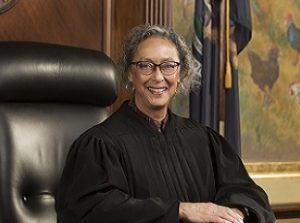By Tom Travis
Flint voters have been given some reassurance about safeguarding election processes by the 7th Circuit Court, where Judge Celeste Bell has granted the bulk of the relief sought by the American Civil Liberties Unions (ACLU) and five Flint voters against Flint City Clerk Inez Brown.
In the end, after a series of motions and hearings over the summer, Judge Bell granted most of the requests sought by the ACLU, agreeing from the evidence presented there were problems in the handling of absentee applications, including delayed mailing and the closing of City Hall.

Image from ACLU website.
Judge Bell granted all of the relief sought by the ACLU had requested in the original complaint against Clerk Brown–all regarding the August primary. Then the ACLU filed an amended complaint concerning the upcoming Nov. 3 election.
But Bell pointed out to the ACLU attorneys in her Sept. 14 ruling on the amended motion that the August primary election and the November general election are two separate events.
Agreeing with an attorney hired by City Clerk Brown, Christopher M. Trebilcock of the Clark Hill law firm in Detroit, Bell explained that while the August primary election is done and over with, ballots for the Nov. 3 election can’t be adjudicated on because “they don’t exist yet.”
The ballots for Nov. 3 hadn’t been printed nor distributed as of the date of that hearing, though they were scheduled to be mailed out beginning Sept. 24. Judge Bell stated, “I don’t see how trying to connect the August election to the November election can help anyone at this time.” But she suggested she would leave the door open for the ACLU to file a new law suit if needed based on what happens as the November processes proceed.
Brown’s lawyer said, “The City Clerk is being drawn into unnecessary litigation on unfounded fears that will need evidential support so we ask the court to deny the motion to amend, dismiss all claims as “moot”. Judge Bell did not dismiss anything only denying the amended complaint brought by the ACLU concerning what could happen in the weeks to come as the November General Election approaches.
Referring to the original ACLU complaint Judge Bell said, “We’ve dealt with the issues in the August election. I’m not saying they can’t re-occur.” But left the door open for new motions to be filed if needed.
The Wheels of Democracy were slowed by closing City Hall; and other elements of the ACLU lawsuit

City Clerk Inez Brown speaking at a press conference she called in August. (Photo by Tom Travis)
One issue that came into play in the ACLU complaints was that City Hall closed its doors in an effort to lessen the spread of the deadly coronavirus on March 17. That action began to slow the wheels of democracy for Flint voters. With City Hall being closed, the City Clerk’s office on the 2nd floor was inaccessible to the public.
In its original complaint, the ACLU claimed that with the City Clerk’s office being closed to the public during an election season “disenfranchised” voters from accessing absentee ballot applications and voting in person at the Clerk’s desk. This set the ACLU in motion to file a complaint in an effort to preserve voting rights. It wasn’t until July 20 that the City Clerk’s office announced it would reopen , offering Monday through Friday hours and weekend hours.
Subsequently, Judge Bell heard arguments from the ACLU and City Attorney Angela Wheeler in late July in response to the complaint filed against the City Clerk.
Bell ruled in favor of the ACLU, ordering the Flint City Clerk to comply with several terms, including the Clerk’s office increasing open hours and days.
In addition, the judge ordered the City Clerk to present a daily report of absentee ballot applications to be presented to the Court.
Judge Bell offers pointed pandemic ruling in July 21 ruling
Bell stated in her July 21 ruling that “the Court acknowledged there is detrimental effect from the COVID-19 pandemic and the statewide shutdown” has had on the conduct of all governmental business.
Bell also acknowledged the Genesee County ballots were delayed due to candidate challenges. The printing of the ballots was delayed as the Court ruled whether or not attorney Chris Christensen’s name could appear on the ballot.
Bell acknowledged those issues caused delay to the City Clerk’s meeting a statutory deadline of providing ballots during the 40 days prior to the election.
Bell continued, “Nonetheless a substantial delay has occurred in providing absent voter applications and ballots that cannot be explained or excused by the unfortunate circumstances affecting the voters and the City Clerk.”
7th Circuit Court Judge Celeste Bell. (Photo from Genesee County Court website.)
Bell ordered that the voters of Flint are “in danger of irreparable harm through the loss of their constitutional absentee voting rights if the City Clerk fails to take immediate steps as required by this Order to comply with legal mandates regarding the issuance of absent voter ballots.”
ACLU attorney Alec Gibbs stated in the July 21 hearing that “There may not have been nefarious actions but there has been systematic failures by the City Clerk’s office.” Gibbs added that “The time line presented establishes the City Clerk’s office had no intention to comply.
“No other municipality in Genesee County has had this problem of getting Absentee applications and ballots processed and issued,” he said. “We have seen a pervasive pattern of non-compliance. The only thing left for the Flint residents is for this court to issue relief.”
County elections official calls out City Clerk’s errors
Following the Aug. 4 primary election, Genesee County Elections Supervisor Doreen Fulcher sent a letter from County Clerk John Gleason’s office to Inez Brown. In the letter, Fulcher listed at least 19 “deficiencies” and “failures” by the City Clerk’s office in the Primary Election.
Brown never responded to that letter. However, she did speak at the next City Council meeting. City Council President Monica Galloway (7th Ward), by special order on the agenda, asked Brown to come before the council.
Council members asked Brown what help she needed for the Nov. 3 election. Brown responded by speaking to City Council for little over 30 minutes, explaining that in the next 45 days leading up to the Nov. 3 election what her staff would do.
Brown stated that election workers will have training and retraining sessions, additional election workers will be hired; Public Service Announcements (PSA) will be produced and shared throughout the community on cable TV and YouTube; the Absentee Voter Counting Board (AVCB) will have additional training; and deputy clerks are available if a phone request is made to the Clerk’s office to have a ballot picked up at someone’s house. Also, Brown said she has invited Secretary of State Jocelyn Benson to visit Flint on a weekend yet to be decided.
In a follow up phone call after the initial publication of this story, Genesee County Clerk John Gleason clarified that Fulcher composed the letter in her role as secretary of the Board of Canvassers. The letter, he said, was not from him. While the letter was written on Gleason’s County Clerk office letterhead Gleason insisted that he knew nothing of the letter until after it was sent.
Community leaders and clergy defend City Clerk and call on County Clerk to cease and desist
In response to Fulcher’s letter from Gleason’s office, Pastor Chris Martin and a group called Flint Unity Coalition of Pastors held a press conference Aug. 25 to defend Brown.
Pastor Chris Martin spoke for the group, which included City Council President Monica Galloway (7th Ward) and Councilperson Eric Mays (1st Ward). Martin stated, “There have been no misgivings or malfeasance in the City Clerk’s office,” Martin declared at the press conference. “John Gleason needs to cease and desist his bullying tactics against Ms. Inez Brown.”
Asked what level of accountability the County Clerk’s office has over the Flint City Clerk’s office, Gleason replied, “none.” The Genesee County website suggests there is some jurisdiction. But ultimately the City Clerk answers to the Flint City Council.
Resources for voters
Voters are reminded that information about how to vote and absentee ballot application and tracking the process of how your application is handled can be seen at www. vote.org. Additional voter information can be seen at the Michigan Secretary of State’s website www.michigan.gov/sos. According to the Secretary of State’s absentee voting page voters can request an absentee ballot until 5 p.m. on the Friday before the election.
The Detroit News reported that a Michigan Judge that city clerks must accept absentee ballots if postmarked by Nov. 2 and are received within 14 days after the election. This will change the final results of election night from being within hours to two weeks.
EVM assistant editor can be reached at tomntravis@gmail.com.



You must be logged in to post a comment.